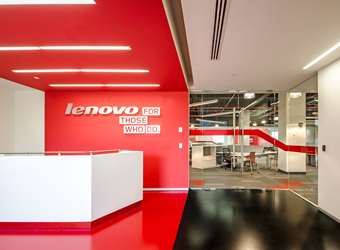How does a business full of brilliant engineers sell products in a human rather than a geeky way, in a manner that appeals to your average Joe but doesn’t alienate hard-core fans? It’s a problem that many technology companies face.
At Chinese business Lenovo, the company has relied on the steadiness of its computers to appeal to CIOs (chief information officers), but their employees don’t always have the same attitude.
“If you’re a CIO, you know what Lenovo does, you like to buy Lenovo because it’s great quality, it’s reliable, they know how it works. Their issue is getting the users to want the Lenovo products that they have,” Lenovo’s Chief Marketing Officer David Roman told CNBC.
Part of the solution for Lenovo is to up the ante with marketing, and to that end it will run a competition looking for the 25 ThinkPad laptops that changed the world to celebrate the brand’s 25-year anniversary.
Roman proudly states that there’s a ThinkPad on the International Space Station, and it’s also the computer behind physicist Stephen Hawking’s speech. It will also run a new TV ad for its Yoga laptop, starting in the U.K. in early October, and launched a “Star Wars” augmented reality game with Disney last month.
More broadly, Lenovo has briefed a London agency to come up with a “story” for the brand to try to give it a more human appeal.
“Typically the story of the company is something that you do through investor relations and the company has previously talked about the two streams of East and West culture blending,” Roman said, adding that the company has dual headquarters in Beijing and in Morrisville, North Carolina, and is listed in Hong Kong. Now the focus will be on personality. “What we’re trying to do is really make it relevant, show our personality, show the attitude, what drives the company, what motivates us.”
Now the focus will be on personality. “What we’re trying to do is really make it relevant, show our personality, show the attitude, what drives the company, what motivates us.”
Roman said his department is helping the company grow in the long term, with a focus on customers and trends, as well as an “outside-in” point-of-view on the business.
“We are in a better position to look at the trends, the changes, so marketing is taking a bigger role in terms of driving the growth of the company,” he said.
Although Lenovo saw poor results recently, losing $72 million in the quarter to June against a profit of $173 million for the same period in 2016, Roman told CNBC that heavy investment in “second wave” products such as smartphones and data centers had had an impact. He expects the investment to pay off later in the year.
Roman added that the proliferation of products in the technology sector will become “ten times worse in three years,” and that his role as a chief marketer is to bring products and branding together in a consistent way.
“If you are a consumer looking for a phone, a tablet, a PC, a gaming device (or) VR goggles, we want your perception of Lenovo to be the same. We still have a Moto campaign (for Motorola), a Yoga (laptop) campaign (and) we want to make them similar and part of a broader consumer (-facing) campaign.”
While he was open about the loss in the last quarter, Roman emphasized that the company’s “three-wave” strategy was on track. The first wave – its current PC business – saw a 7 percent increase in its average selling price.
“In a market that is going down (it) points to the fact that we have focused the mix on higher-end products, more profitable products,” he said. He was also positive about the second wave – smartphones and data centers, and said third wave products would see investment, such as machine learning, augmented reality and virtual reality.
“Obviously one hates not to have the profit but at the same time in terms of reaching the milestones (we set) we feel that strategy is actually happening, we maintained our guidance for the year so we see the growth.”
Source: CNBC


